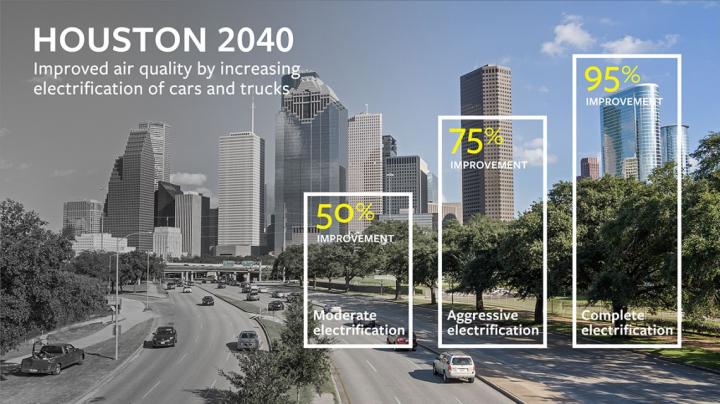
Credit: Cornell University
ITHACA, N.Y. – Cornell University researchers are expressing hope for the future of Houston’s breathable air, despite the city’s poor rankings in the American Lung Association’s 2019 “State of the Air” report.
The report, released in April, ranked Houston ninth nationally for worst ozone pollution and 17th for particle pollution.
Researchers say replacing at least 35 percent of Houston’s gasoline cars and diesel trucks with electric vehicles by 2040 will reduce pollution and improve air quality by 50 percent.
“The built environment plays a significant role in affecting our daily life and health,” said H. Oliver Gao, professor of civil and environmental engineering and senior author of “Potential Impacts of Electric Vehicles on Air Quality and Health Endpoints in the Greater Houston Area in 2040,” published in Atmospheric Environment.
“While transportation provides us with mobility, it impacts our environment and our public health,” said Gao, who directs Cornell’s Center for Transportation, Environment and Community Health and is a fellow at Cornell’s Atkinson Center for a Sustainable Future. “We are enjoying this mobility at a very high cost.”
Shuai Pan, postdoctoral associate in civil and environmental engineering, along with Gao and a team of chemists and engineers, modeled four scenarios using various levels of electric car adoption to see how Houston’s air quality and public health likely would respond two decades from now.
“The population in 2040 Houston will see a huge increase, but we can apply new technology to reduce emissions, improve air quality and think about health,” said Pan, who earned his Ph.D. in atmospheric science from the University of Houston in 2017.
In their exhaust, gasoline and diesel vehicles emit nitrogen oxides – volatile organic compounds that react in the presence of sunlight to form ozone and increase detrimental fine particulates, elements known to harm human health.
If left unchecked, current ozone and particulate-matter levels would result in 122 more premature deaths annually throughout greater Houston by 2040. With moderate or aggressive electrification for cars and trucks, the numbers reflect air-quality improvement, with prevented premature deaths at 114 and 188, respectively.
In the case of complete turnover to electric vehicles, the number of prevented premature deaths per year around Houston shoots to 246.
“Mayors or policymakers – who care about the environment, the economy and public health – must advocate for electrification,” Gao said. “The knowledge is there, but we need mayors and city planners to be creative and innovative to design policies that would help the electrification of the transportation sector.”
###
Other contributors were Yunsoo Choi, associate professor of atmospheric chemistry, postdoctoral fellow Anirban Roy and doctoral candidate Ebrahim Eslami, all of the University of Houston; Stephanie Thomas, Public Citizen, a nonprofit public advocacy organization; and Xiangyu Jiang, University at Buffalo.
Funding for this work came from the U.S. Department of Transportation.
Cornell University has dedicated television and audio studios available for media interviews supporting full HD, ISDN and web-based platforms.
Media Contact
Lindsey Hadlock
[email protected]
Original Source
http://news.
Related Journal Article
http://dx.



